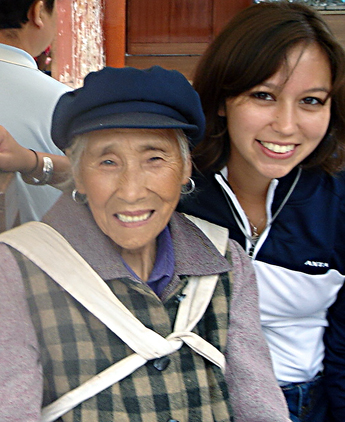
An ancient Chinese culture inspired Liz Voeller's 21st-century environmental action. While researching what happens when ancient history and tourism collide in a small Chinese village, the fifth-year senior encountered the Naxi, one of the country's 56 recognized ethnic groups, in southwestern China. Naxi culture, which follows Dongba, a religion based on the relationship between humans and nature, "has always worked toward conserving their environment," Voeller says.
With the help of an Undergraduate Research Grant Voeller performed research in Lijiang in Yunnan province in summer 2008. She learned that the Naxi had built a complex system of canals for purifying water. The canals were designed to ensure that everyone had clean water to drink, as well as water for cleaning. (See Voeller's blog, Cultural Impacts on Infrastructure, on her experiences in Lijiang.)
"This sort of thing excites me," Voeller says, "using technology to address human needs."
That's been a theme of her time at Northwestern. During her sophomore year she became involved with the Global Engagement Summit, an annual, Northwestern-hosted meeting of students from around the world who come together to produce responsible, innovative and sustainable solutions to shared global problems. (See our story, "Just Naïve Enough to Care," summer 2006, on the GES founders, Jonathan Marino [SESP06] and Nathaniel Whittemore [WCAS06].)
The summit inspired Voeller to study abroad in Cameroon. Witnessing the demand for clean drinking water there, Voeller decided to pursue environmental engineering and international studies. (She also found inspiration to perform with the University's African Drum and Dance Ensemble.)
Voeller, once a member of Northwestern's Engineers for a Sustainable World, has also worked on a waste-to-fuel project, exploring the possibility of using vegetable oil from campus dining halls to power University shuttles. Beyond engineering, she also participated in rallies, both on campus and in Washington, D.C., for the Northwestern University Darfur Action Coalition, a group that raises awareness about genocide and the humanitarian crisis in Sudan.
Voeller hopes to dedicate her life to addressing human needs. She knows she'll have to get to know the people whose situations she works to change, and she sees the need for greater social interaction within the scientific fields.
That philosophy of breaking down barriers through social interaction also guided her Northwestern experience. "It's the connections that you make in college that are most important," she says. "I would not be where I am today if it weren't for my experiences and older student mentors here at Northwestern, both on campus and off. It's scary and exciting to think, too, how I just 'fell' into these experiences."
Next year Voeller plans to work with an environmental nonprofit in Beijing.
— Fathima Khan (WCAS09) |
